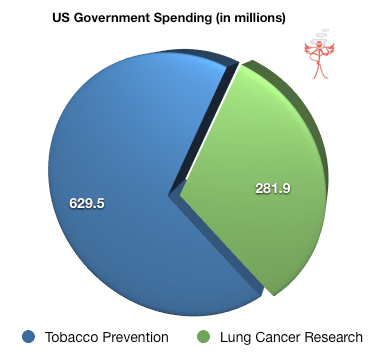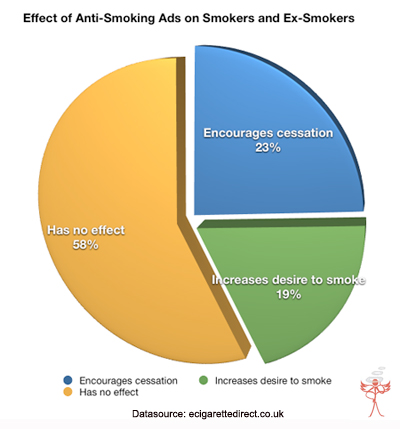Recently I displayed 37 of the more controversial smoking ads to smokers and ex-smokers.
Anti-smoking ads have fascinated me ever since I saw research that suggested cigarette warnings could have a very unwelcome effect - increasing the desire to smoke rather than decreasing it!
So I asked smokers and anti-smokers if anti-smoking ads made them want to:
a. Quit b. Smoke more c. Had no effect
(You can see all the ads here: 37 Anti-Smoking Ads - But Do They Work?)
The question is an important one, because spending on anti-smoking advertising is so vast, it actually outweighs spending on lung cancer research, as shown in the chart below:

The difference in spending may mean more lung cancer victims have died. The chart below shows the discrepancy between improvements in lung cancer survival rates and breast cancer survival rates since the 1970's.

What people said
More interesting than the stats, I think, are what people said.Kate from Vapers Network (who unhelpfully chose all three options!), worried that the adverts could contribute to the high level of mental health problems suffered by smokers:They really are quite brutal on the psyche, a kind of mental violence really, it's no wonder so many smokers are depressed and suffer from other mental health problems.Others argued that in a time when we are regularly exposed to horror films, we are hardened to the effect of anti-smoking adverts. Richard Ivers wrote:
I was brought up on a diet of horror films sans hollywood so a few images certainly isn't going to even get noticed much. I've read medical textbooks and seen much worse. Like others I quit for my own reasons one of which being the cost.The ads still had the ability to affect some readers. Dr. John Connell of the Tobacco Harm Reduction blog was one of several who expressed disgust, especially at the thought of the effect of the posters on young children:
They disgust me in their blatant use of adult themes that are witnessed by young children. An 8 year old seeing (erotic adds not even included) such images with a parent who smokes may comprehend the message and immediately relate it to a smoking parent.Several smokers linked the shock value to a desire to smoke:
The ads have always raised my anxiety which strangely enough makes me want a ciggy!wrote Alice Nicholls, while Michael Wainwright joked:
Anyone got a light?However, almost a quarter of the respondents wanted to quit after seeing the ads. Kelly Hockins wrote:
A I really want to give up now especially that I have 4 kids half of the pictures made me feel sick and want to cry I need help! :-( xThere are many other excellent viewpoints from smokers and ex-smokers - if you have a minute, why not browse or add your own thoughts!
Food for thought
Unfortunately my little poll raised more questions than it answered.- Does the desire to quit lead to successful quitting?
- Does a temporary increase in the desire to smoke cause any real damage to smokers?
- Does the possibility of more people quitting outweigh the psychological damage the ads could cause to children and smokers?
If anti-smoking ads make some smokers want to smoke, couldn't they also make some ex-smokers want to smoke?
p.s. Thanks to everyone from Vapers Network, the THR group on Facebook, Google Plus, We are CASSAA and elsewhere who helped me out with links to data on anti-smoking advertising and lung cancer research. I've used a fraction of the data here but saved up more for a future blog post.
Update: Since I wrote this blog posts Dick Puddlecote has blogged that cigarette warnings have been judged ineffective in a study from the National Centre for Social Research. Professor Siegel has written further on the topic, reporting that cigarette warnings that threaten or disgust cause a defensive reaction in smokers, rendering the warning useless.
